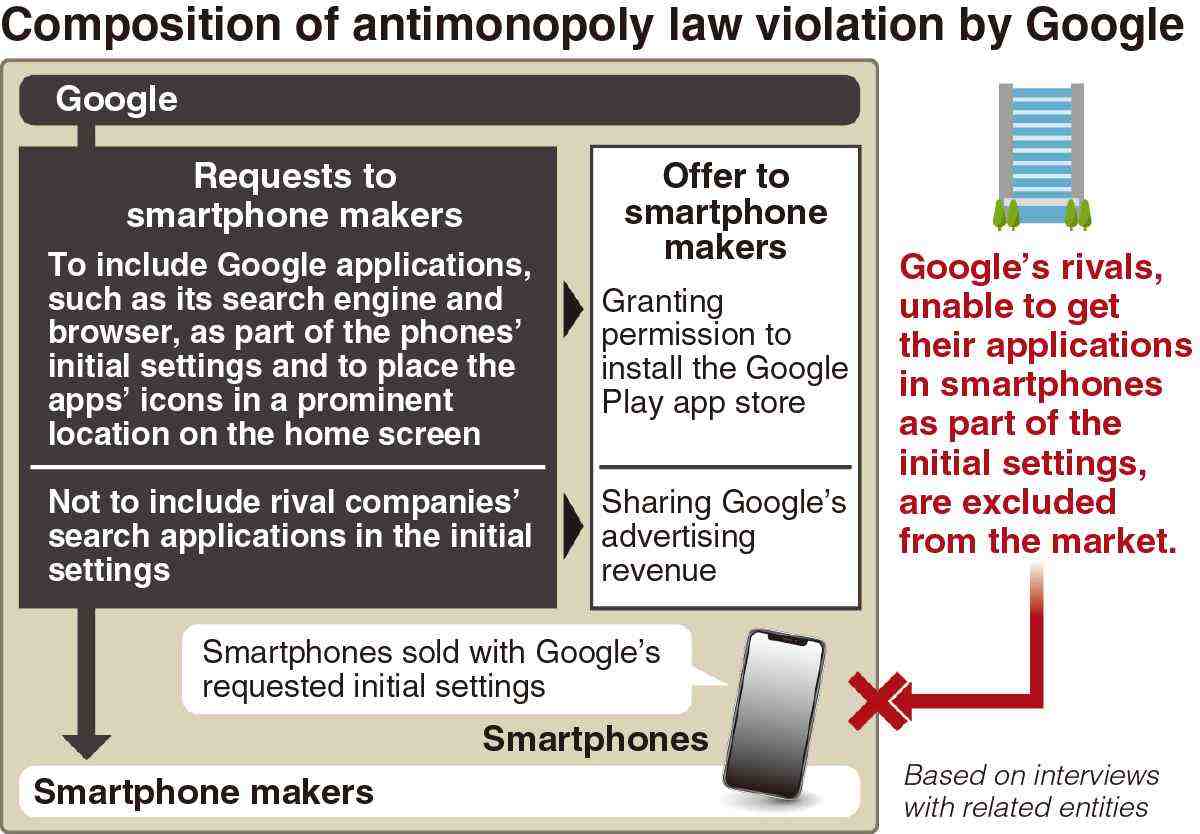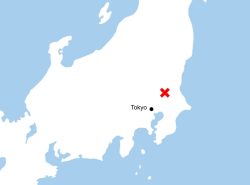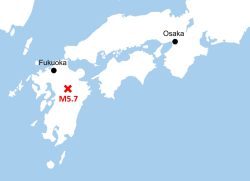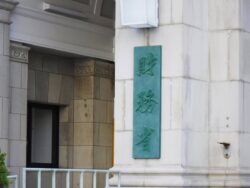JFTC Set to Punish Google for Unfair Practices; Fair Trade Watchdog Takes a Typically Strong Action against Big Tech

The logo of Google LLC is shown at an entrance to one of their buildings in San Diego, California, U.S., October 9, 2024.
16:59 JST, December 23, 2024
The Japan Fair Trade Commission has decided to issue a cease-and-desist order against Google LLC for violating the Antimonopoly Law by pressuring smartphone manufacturers to prioritize Google’s search applications on their smartphones, it has been learned.
It is the first time the JFTC has issued an order of this kind against one of the giant IT companies that make up the group known in Japan as “GAFA” — Google, Apple, Facebook (now Meta) and Amazon.
The JFTC believes that Google’s actions have restricted smartphone makers’ business activities and constitute “trading on restrictive terms,” a practice prohibited under the Antimonopoly Law. The watchdog has already notified Google of its plan to issue the cease-and-desist order. It is set to make a formal decision after hearing Google’s opinion.

According to sources, Google has required manufacturers of Android smartphones sold in Japan to include the Google Search and Google Chrome apps as part of their phones’ initial settings before giving the manufacturers permission to install the Google Play app store. The company reportedly requested that both applications’ logos be placed in a prominent location on the home screen.
It is also believed that Google concluded contracts to share advertising revenue with the smartphone makers under the condition that rival companies’ search applications would not be included in the phones’ default settings.
The JFTC has in recent years intensified its scrutiny of GAFA, which holds a dominant position in the Japanese market. Since 2016, the watchdog has repeatedly investigated the companies. It imposed administrative penalties on Amazon in 2020 and on Google in April this year.
However, in both instances, it only ordered the implementation of “commitment procedures,” in which the companies involved are merely expected to remedy the suspected violations as soon as possible.
In principle, investigations by the JFTC are not made public until an administrative action is taken, even if there is a suspected violation of the Antimonopoly Law. The current investigation, which began in October last year, is the first case of the JFTC making public an outline of charges at such an early stage. It has gathered information from a wide range of related entities, including Google’s business partners and users, in order to clarify the facts.
According to the sources, Google proposed commitment procedures about a month ago. However, the JFTC decided that strong action against the company was necessary this time, since most of the facts of the violation had already been identified. Rather than order the commitment procedures, the JFTC decided to issue the cease-and-desist order, demanding an end to the violations and prevention of any recurrence.
Under the law, the company can be fined up to ¥300 million if it fails to comply with the order.
"Society" POPULAR ARTICLE
-

M4.9 Earthquake Hits Tokyo, Neighboring Prefectures
-

M7.5 Earthquake Hits Northern Japan; Tsunami Waves Observed in Hokkaido, Aomori and Iwate Prefectures
-

Tsukiji Market Urges Tourists to Avoid Visiting in Year-End
-

Israeli Tourists Refused Accommodation at Hotel in Japan’s Nagano Pref., Prompting Protest by Israeli Embassy and Probe by Prefecture
-

M5.7 Earthquake Hits Japan’s Kumamoto Pref., Measuring Upper 5 Intensity, No Tsunami Expected
JN ACCESS RANKING
-

Keidanren Chairman Yoshinobu Tsutsui Visits Kashiwazaki-Kariwa Nuclear Power Plant; Inspects New Emergency Safety System
-

Imports of Rare Earths from China Facing Delays, May Be Caused by Deterioration of Japan-China Relations
-

University of Tokyo Professor Discusses Japanese Economic Security in Interview Ahead of Forum
-

Japan Pulls out of Vietnam Nuclear Project, Complicating Hanoi’s Power Plans
-

Govt Aims to Expand NISA Program Lineup, Abolish Age Restriction






















